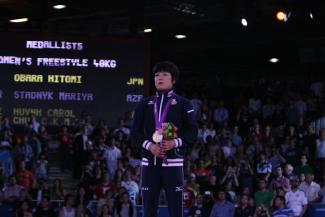Purevdorj reignites Olympic quest with Ulaanbaatar Open gold
Friday, June 20, 2025 - 09:31 By Vinay Siwach

ULAANBAATAR, Mongolia (June 18) -- The last time Orkhon PUREVDORJ (MGL) wrestled in front of home crowd in Ulaanbaatar, she was one of the top wrestlers in the world at 62kg.
She was the 2017 world champion and a year before that, she had ended Kaori ICHO's (JPN) 13-year long unbeaten streak at the Ivan Yaryguin Grand Prix. Then in 2018, she won the Asian Championships in Bishkek and the Mongolian Open gold medal in Ulaanbaatar.
Few months later, she failed a dope test at the Asian Games, where she had won the gold medal in 62kg. Her rise turned into a fatal fall and Purevdorj was left to serve the four-year ban. During her long hiatus, Purevdorj focused on personal life.
“I was very sad but I decided to just live and raised my son. I kept myself busy with him,” Purevdorj says. “The most important thing is my mind. It's important to be strong.”
Purevdorj, who still remains Mongolia last world champion in wrestling, made her comeback in 2022 and was part of the Mongolian team to the World Cup. She won silver medal at the Asian Championships in 2023 and qualified for the Paris Olympics in 2024.
Seven years since the ban and now in the twilight of her wrestling career, Purevdorj is hoping to reignite the fire to wrestle. She took the first step by winning a gold medal at hte Ulaanbaatar Open. The 31-year-old won in 62kg in front of her family and local fans to once again stamp herself as the best wrestler in Mongolia and even Asia.
"I am wrestling for the second time [first time internationally] this year but it's hard," she says after her gold-medal bout against compatriot and rival Tserenchimed SUKHEE (MGL) who she defeated 11-2 to win the gold medal.
At the Buyant Ukhaa Sport Palace in Ulaanbaatar, Purevdorj is joined by her husband, son and even parents as they watch her wrestle live after a long time. It's not an ideal start for her as she gets hammered 10-0 by Alina KASABIEVA (UWW), a wrestler she has defeated multiple times in her career before.
That's not what Purevdorj or her family expected in the first bout itself. But she runs back to the warm-up hall and prepares for the second bout, this time against Asian champion MANISHA (IND). And Purevdorj looked in form against the Indian, winning via fall. [The 62kg bracket at the Ulaanbaatar Open was a round-robin bracket, hence giving Purevdorj the second chance].
The fall helps Purevdorj get five classification points and a place in the semifinal over Manisha. She will wrestle Ekaterina KOSHKINA (UWW) for a spot in the final. Her son, six years old, keeps cheering every time he sees his mother on the mat.
Koshkina takes Purevdorj to the limits scoring via counters. Still, Purevdorj led 9-7 at the break and both resumed their dynamic wrestling. Purevdorj managed to defend some of the attacks from Koshkina and ultimately won 15-11.
In a high-affair all-Mongolian final at 62kg, Purevdorj put on a defensive masterclass to beat Tserenchimed SUKHEE (MGL), 11-2, and capture the gold medal.
"I was able to win because I played calmly," she said after the final. "In the first match, I was not good mental state and was not ready. But next match I was better."
Purevdorj celebrated with a few photos with her family and coaches. She looked visibly tired after the four bouts and could use some rest days.
"As I said, it's hard. I am not sure about anything," said Purevdorj, who was wrestling a UWW tournament for the first time since the Paris Games.
 Orkhon PUREVDORJ (MGL) celebrating after becoming a world champion in 2017. (Photo: United World Wrestling / Martin Gabor)
Orkhon PUREVDORJ (MGL) celebrating after becoming a world champion in 2017. (Photo: United World Wrestling / Martin Gabor)
When she began wrestling 17 years ago in Ulaanbaatar after her cousins introduced her to the sport, Purevdorj did not think she will reach this level. So being a world champion makes her feel happy and she is proud that she choose this sport.
“I'm seventh child in my family and only I am a wrestler. My cousins were wrestlers but they stopped soon but I never stopped. I really loved it."
But she regrets not having an Olympic medal. She has been on that stage twice but fell short. In Rio 2016, she lost in the repechage while in Paris, she lost to her long-time rival Aisuluu TYNYBEKOVA (KGZ) in the bronze-medal bout.
Now, the only motivation to be at the 2028 Los Angeles is to get an Olympic medal which may complete her journey. A medal will make her the third Mongolian wrestler to win a medal in Women's Wresting.
“I'm not sure about wrestling till Los Angeles. But I'm just trying,” she said. “The last Olympics were so hard for me in my career. I'm trying again, and I've started this year. There are many wrestlers in 62kg who are better but I have to train more.”


Share your thoughts.
Comments